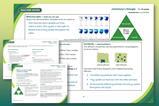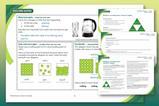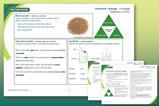PGCE course chemistry lead Jo Haywood reflects on the challenges of teaching training in the pandemic, and ponders the shadow they will cast in the future

At the start of 2020, there was a lot of talk about Covid-19 and what might happen, but there was disbelief that schools would shut. And then, with just a few days to prepare, most schools closed.
So what did teacher trainers do next? We immediately transferred our PGCE course activity online, for both faculty-based teaching and school placements. Trainees and mentors adapted amazingly to the sudden change. Mentors still held weekly meetings, and trainees continued to work in a structured way to support their development targets. They taught in different ways: delivering live lessons on a range of (sometimes new) platforms, planning remote lessons and supporting students who were in school. We expected an extraordinary amount from trainees, but they were equal to it all.
Trainees were inventive. They used models, simulations and ran demos in school to stream to classes
Talking to colleagues on other initial teacher education programmes, it’s clear that other courses and schools across the country experienced this sudden upheaval – and trainees and teachers responded with astonishing determination and willingness.
Virtual challenges
There were, of course, challenges. It’s hard to gain behaviour management experience in a ‘normal classroom’ when it doesn’t exist. But there are ways to work around this. We took every opportunity possible in a classroom. Although classes weren’t as big, there were opportunities to work with SEND students, so trainees could think about how to adapt their teaching to best support them. Behaviour management online was a completely different challenge, but still built relevant skills. And trainees read, thought, reflected, planned and worked together to discuss their individual environments and what they could learn from each other.
Practical work was another challenge for online chemistry lessons. Demonstrations and videos aren’t the same as whole-class practicals, both in terms of building skills or supporting conceptual learning. So, trainees were inventive. They used models, simulations and ran demos in school to stream to classes. They redesigned tasks to ensure development of practical skills. Schools and faculties often supported trainees in carrying out demonstrations with dedicated technicians producing individual trays of equipment. There is a lot we will take forward to enhance learning, such as using simulations for experiments, which help students understand what’s going on rather than just think procedurally. There are also things we’ll be pleased to leave behind.
By summer 2020, we could teach small groups of PGCE students in person. We did lots of practical work to support the work done in school, to ensure trainees were as confident as possible by September.
This amazingly resilient cohort of trainees have gone from strength to strength. It’s great to go into schools now and see what they’ve achieved. Some are mentoring this years’ cohort of trainees, and the feedback and development they are facilitating is fabulous. They work in a range of school types, having found places they really belong, and many have gone on to complete a master’s in education, thinking further about their classroom practice and how they can continue to develop.
How were students affected?
Students’ independent learning skills improved but they missed out on collaborative work. Students of all ages have had a different experience and we, as educators, must recognise this and find out where they are in their learning, meet them there, and take the next steps for their learning and development.
Thankfully, this ethos of responding flexibly to individuality is intrinsic to our PGCE course, and our trainees will need to continue to consider pupils’ learning and skills loss. We will need to consider how our trainees have been affected, with their different university or work experiences, difficulty in accessing school observations or challenges around mental well-being. As scientists, we know that language is a barrier to students understanding our subject so, in time, the communication and language challenges reported in EYFS are going to matter, and we must remember and respond. On the PGCE course we already focus on language and communication, how vital it is to learning and how to facilitate discussion in the classroom. In future, we will need to monitor and adapt as new cohorts join secondary schools.
It continues to be a privilege to work with outstanding new teachers and wonderful partner schools. The trainees who started on this path during Covid-19, and those training now, will rise to the challenges in the years ahead with the help of their amazing mentors and colleagues.
Jo Haywood teaches at secondary school and undergraduate level














No comments yet